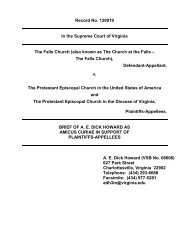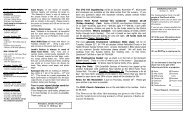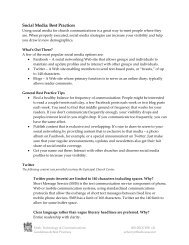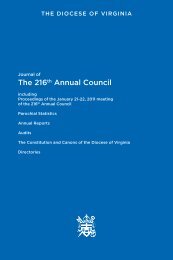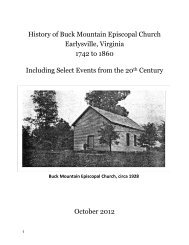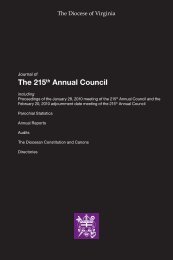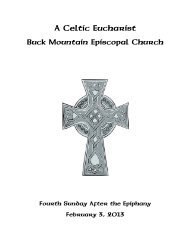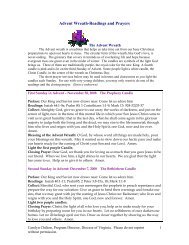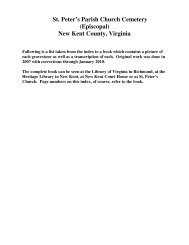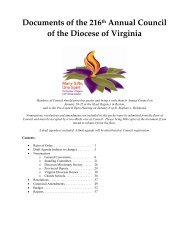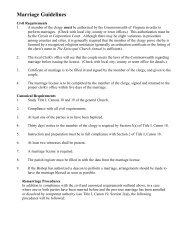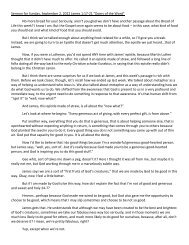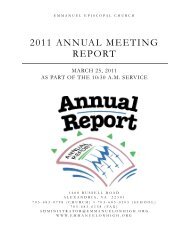The 213th Annual Council - Diocese of Virginia
The 213th Annual Council - Diocese of Virginia
The 213th Annual Council - Diocese of Virginia
Create successful ePaper yourself
Turn your PDF publications into a flip-book with our unique Google optimized e-Paper software.
Proceedings<br />
“<strong>The</strong> majority <strong>of</strong> the members <strong>of</strong> the Commission believe there is an ‘emerging consensus’<br />
regarding permitting <strong>of</strong> ‘local option’ for the blessing <strong>of</strong> same-gender unions. <strong>The</strong>re is a<br />
shared desire to actively support those who are in same gender partnerships reflecting<br />
mutuality and fidelity, and a conviction that pastorally responsive ministry should include<br />
the blessing, under appropriate circumstances, <strong>of</strong> those partnerships. Scripture addresses<br />
lifelong committed relationships characterized by fidelity, monogamy, mutual affection<br />
and respect and the holy love that enables those in such relationships to see in each other<br />
the image <strong>of</strong> God. <strong>The</strong> document A Response to the Invitation <strong>of</strong> Windsor Report, states: ‘It<br />
seems very likely that there was no phenomenon in the time <strong>of</strong> biblical writers directly<br />
akin to the phenomenon <strong>of</strong> Christians <strong>of</strong> the same gender living together in faithful and<br />
committed lifelong unions as we experience this today.’ (page 19, paragraph 2.18) This<br />
majority acknowledged the lack <strong>of</strong> use <strong>of</strong> available spiritual, theological and scriptural<br />
resources (such as materials from Integrity and the document, ‘Claiming the Blessing’) for<br />
better education within our own <strong>Diocese</strong>. It is believed these deficiencies have hindered<br />
forward movement in faith and understanding.<br />
“For a minority <strong>of</strong> the Commission, who find no support for same-gender unions in<br />
Scripture, a pastorally responsive ministry would not include sacramental blessings.<br />
Furthermore, these members, understanding that 1) a blessing is an authoritative<br />
pronouncement <strong>of</strong> God’s favor on a relationship (Oxford Dictionary <strong>of</strong> the Christian Church);<br />
2) that same-gender unions are inconsistent with the established position <strong>of</strong> the Anglican<br />
Communion as reflected in Lambeth Resolution 1.10 and the Windsor Report; and 3) that<br />
same-gender unions are nowhere approved <strong>of</strong> in Holy Scripture, are opposed to any action<br />
that would support such blessings, at least until further theological study has established<br />
otherwise. Since a consensus entails an agreement based on the willing consent <strong>of</strong> the<br />
parties rather than a numerical plurality or majority, these members understand there is<br />
presently no consensus in the Commission and likewise in the <strong>Diocese</strong> on this matter.<br />
“Those who represented a moderate perspective on the Commission spoke <strong>of</strong> their own<br />
theological movement from previously held positions regarding the interpretation <strong>of</strong><br />
the biblical references said to address homosexuality and acknowledged the faithful<br />
witness <strong>of</strong> those living in monogamous same-gender relationships within their own<br />
congregations. <strong>The</strong>se members are willing to ‘wait with patience’ for the development<br />
<strong>of</strong> theological and pastoral guidelines for supportive ministry with gay and lesbian<br />
members <strong>of</strong> our Church through future actions <strong>of</strong> General Convention.”<br />
Now here’s an important sentence: “<strong>The</strong> Commission does not regard the expression <strong>of</strong><br />
these views as incompatible with full membership <strong>of</strong> the Church, and we specifically<br />
resolve that we remain in communion with those who hold these views and regard each<br />
<strong>of</strong> them with respect.”<br />
That is more than a “warm fuzzy.” It is a commitment to be mature, at least according<br />
to one definition <strong>of</strong> maturity, and that is the ability to live with unresolved conflict. And<br />
it’s also a commitment to continue to discern, not legislate, but discern ways <strong>of</strong> being<br />
generous and faithful in our common pastoral call, even as we acknowledge that we are<br />
not <strong>of</strong> one mind in this <strong>Diocese</strong> on the permissibility <strong>of</strong> local option in the blessing <strong>of</strong><br />
same-gender unions.<br />
You heard in Bishop Lee’s pastoral address that he will be building on the recommendations<br />
from this commission and taking them a step further by appointing a new commission<br />
called the Windsor Dialog Commission, and its task will be to continue to be pastorally<br />
responsive to the gay and lesbian Christians in our midst while at the same time being<br />
96<br />
<strong>The</strong> <strong>Diocese</strong> <strong>of</strong> <strong>Virginia</strong> t Journal <strong>of</strong> the the 213 th <strong>Annual</strong> <strong>Council</strong>



